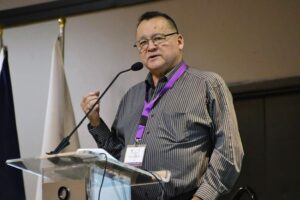Opinion: First Nations need to ‘occupy the field’

By Maurice Switzer
One of Patrick Madahbee’s favourite expressions was, “We need to occupy the field.”
The longtime Anishinabek Nation Grand Council Chief used more specific words to describe that sentiment when he was confirmed as the Nation’s new Commissioner on Governance.
“For the 47 years I have been involved, we have been talking about getting Indian Affairs off our backs. We have an opportunity here now to do this,” said Commissioner Madahbee, urging Chiefs to look through an “Anishinaabe lens” as they moved closer to the June 23, 2022, Anishinabek Nation Governance Agreement (ANGA) with Canada.
As Anishinabek Nation leaders continue their efforts to ensure that the 39 Anishinabek Nation member First Nations have the information they need to become confident in the ANGA with Canada, examples are emerging of the benefits of First Nations creating their own law-making powers.
Participants in the recent Anishinabek Nation Governance Summit held in late February heard there has been a 12-fold increase in the number of Long Lake #58 high school graduates since the First Nation began reclaiming control of its education system. Ogimaa-Kwe Judy Desmoulin credits the Kinoomaadziwin Education Body process for inspiring her community to take back control of educating their children, and notes a concurrent rise in the local employment rate.
With only 200 of its 800 citizens living in the community, Moose Deer Point is making impressive strides since being the first to ratify the Anishinabek Nation Governance Agreement (ANGA) in 2020. Gimaa Kwe Rhonda Williams-Lovett says her First Nation has developed a two-person governance department and is moving forward with creating its own citizenship law.
Anishinabek communities asserting their own jurisdiction independent of the ANGA are also seeing positive results.
Last October, Mississauga #8 First Nation, which has developed a land code, constitution, and community protection law, made history by successfully prosecuting its own law in an Ontario courtroom.
These initiatives convinced a court of the legitimacy of the First Nation’s right to ban an alleged drug dealer from the community. The individual plead guilty to trespassing and failing to obey an order by Mississauga Band Council that she leave the community.
The court ordered the offender to pay a $1,000 fine to the First Nation, which had failed to achieve this result for four years because police questioned the legality of its laws and refused to lay charges.
There have been numerous instances across Canada where First Nations passed Band Council Resolutions to ban unsavoury characters, only to see them avoid censure by hiring lawyers who successfully argued that their clients’ constitutional rights were being breached.
If First Nations do not develop their own law-making powers in a process as systematic as the templates provided by the Anishinabek Nation, courts will default to provincial and federal statutes.
The issues can range from determining who rightfully belongs on a First Nation’s membership list to who isn’t welcome in the community.
So long as First Nations don’t take action to “occupy the field,” somebody else will be making those decisions for them.
Maurice Switzer is a citizen of the Mississaugas of Alderville First Nation.


